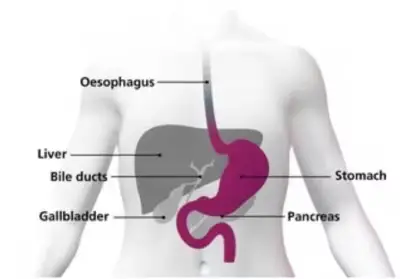Upper gastrointestinal (GI) cancer is a general term used to refer to a group of cancers in the upper part of the digestive system. These cancers include:
- oesophageal cancer - starts in the esophagus (gullet)
- stomach cancer – also known as gastric cancer, often starts in the stomach's inner lining, within the glandular cells of the mucosa
- pancreatic cancer – typically starts in the ductal cells that line the pancreatic ducts
- liver cancer – also known as primary liver cancer, starts within the cells of the liver
- biliary tract cancers - start in the bile ducts or the gallbladder
- small bowel cancer - starts in the small intestine

The symptoms that might need an urgent Upper GI referral to see a specialist (within 2 weeks) include:
- problems with swallowing food, liquids or medication
- increased or new persistent heartburn or indigestion
- loss of appetite or feeling full after only a small meal
- unintentional or unexplained weight loss
- nausea or vomiting
- vomiting of blood
- abdominal pain or bloating
- change in colour of urine; becoming dark
- changes in colour of stool; becoming pale / chalky or very dark / black
- blood in poo
- jaundice – where the whites of the eyes or the skin turn yellow
There are a number of investigations that you may or may not require, which will be discussed with you by a specialist doctor or nurse. These investigations can include:
- Gastroscopy (OGD)
- Computer Tomography (CT) scan
- Magnetic Resonance Imaging (MRI) scan
- Ultrasound scan
- Endoscopic Ultrasound (EUS) scan
At times it will be necessary to have more than one test to ensure an accurate diagnosis.
Following any of the investigations, you may be contacted by the hospital or your clinical nurse specialist asking you to attend for further tests or to discuss your condition.
A team of specialists at CUH will meet to discuss your condition and to make a recommendation about the best possible treatment for you.
You, along with your clinician, will then discuss your treatment recommendations at the clinic appointment and decide on the right treatment plan for you. Your clinician will explain different treatment options and possible side effects.

